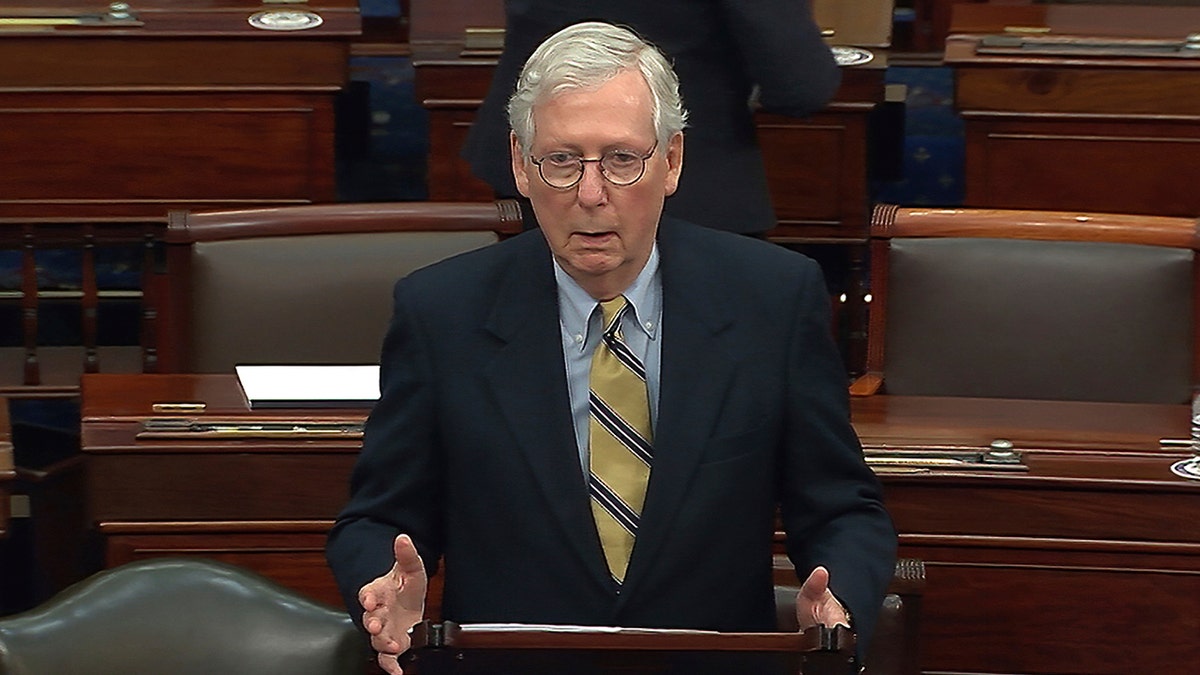Fox News Flash top headlines for February 16
Fox News Flash top headlines are here. Check out what's clicking on Foxnews.com.
Senate Minority Leader Mitch McConnell on Tuesday said he was defending the U.S. Constitution, and not Donald Trump, by voting to acquit the former president of an impeachment charge of inciting an insurrection.
McConnell, R-Ky., in an op-ed for the Wall Street Journal Tuesday called the Jan. 6 Capitol riot a "shameful day" but argued that Article II, Section 4 of the Constitution bars senators from impeaching former officials.
MCCONNELL RIPS TRUMP, SAYS ACTIONS 'UNCONSCIONABLE' BUT TRIAL WAS UNCONSTITUTIONAL
"There is no question former President Trump bears moral responsibility," McConnell wrote, saying his supporters stormed the Capitol because of the "unhinged falsehoods he shouted into the world's largest megaphone."
McConnell called Trump's behavior during and after the riot "unconscionable" and said he was "as outraged as any member of Congress."
"But senators take our own oaths. Our job wasn't to find some way, any way, to inflict a punishment," he wrote. "The Senate's first and foundational duty was to protect the Constitution."
Trump was the first president in U.S. history to be impeached twice, and the first president out of office to go through an impeachment proceeding.
TRUMP CELEBRATES ACQUITTAL IN SENATE TRIAL, FORESHADOWS POLITICAL FUTURE: 'MUCH TO SHARE'
"The House's 'sole power of impeachment' and the Senate's 'sole power to try all impeachments' would constitute an unlimited circular logic with no stopping point at former officers," he continued. "Any private citizen could be disqualified. This is why one House manager had to argue the Senate possesses 'absolute, unqualified' jurisdiction. But nobody really accepts that."

In this image from video, Senate Minority Leader Mitch McConnell of Ky., speaks after the Senate acquitted former President Donald Trump in his second impeachment trial in the Senate at the U.S. Capitol in Washington, Saturday, Feb. 13, 2021. (Senate Television via AP) ((Senate Television via AP))
McConnell said his position aligns with "the early constitutional scholar Justice Joseph Story," who observed that "while disqualification is optional, removal is mandatory on conviction."
"The Constitution presupposes that anyone convicted by the Senate must have an office from which to be removed," McConnell explained. "This doesn’t mean leaving office provides immunity from accountability. Former officials are 'still liable to be tried and punished in the ordinary tribunals of justice.' Criminal law and civil litigation ensure there is no so-called January exemption."
Fox News reported last week that there is a criminal investigation in Georgia into whether Trump broke any laws with his phone call to Georgia Secretary of State Brad Raffensperger in which he asked Raffensperger to "find" enough votes to hand the state to Trump.
McConnell shifted, saying there is a "modern reflex to demand total satisfaction from every news cycle."
"But impeachment is not some final moral tribunal. It is a specific tool with a narrow purpose: restraining government officers," he explained. "The instant Donald Trump ceased being the president, he exited the Senate’s jurisdiction."
McConnell said he respects his Senate colleagues who voted to convict, acknowledging that the text is "unclear."
Democrats have blamed McConnell for not bringing the Senate back into session to consider the article of impeachment that was passed by House on Jan. 13, one week before Trump left office.
McConnell countered that "no remotely fair or regular Senate process could have started and finished in less than one week," saying that "even the brisk impeachment process we just concluded took 19 days."
CLICK HERE TO GET THE FOX NEWS APP
Rushing the Senate back into session would have "shredded due process and ignited a constitutional crisis in a footrace to outrun our loss of jurisdiction," he wrote.
"This selective disregard for rules and norms is a civic disease that is spreading through the political left," he said.














































